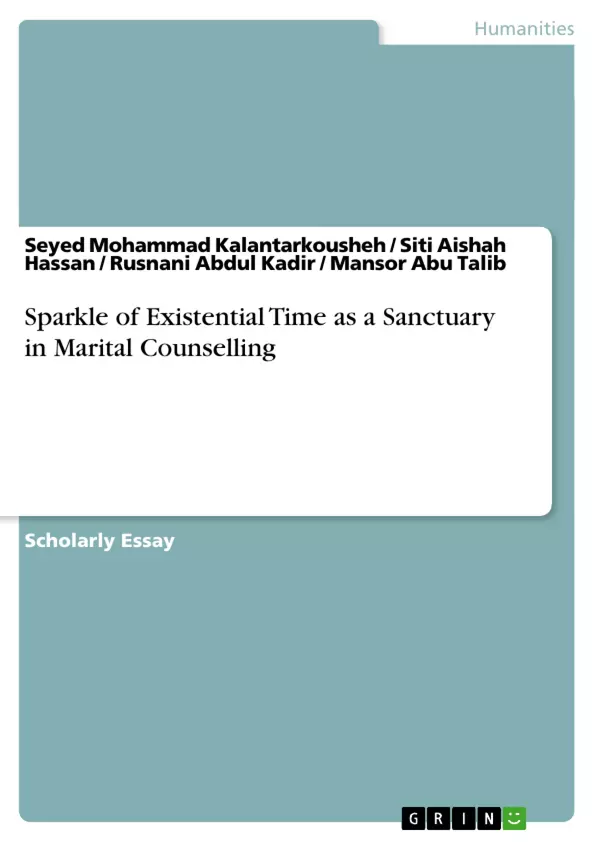Nowadays, Existential thought is considered to be a practical approach among psychologists and
counsellors . Nevertheless, what seems to be ignored is paying thoughtful attention to all dimensions of Existential
thought which is an essential matter among counsellors and psychologists. Moreover, some issues in Existential
thought such as time are disregarded among marital counsellors as well as individual counsellors. The goal of this
article is to allocate exhausting existential time to benefit marital counsellors. Findings show that existential time has
full potential to be applied for marital counselling. Furthermore, review of the related literature demonstrates that
there is not enough experimental and descriptive research to evaluate the effect of existential time on matrimony.
Inhaltsverzeichnis (Table of Contents)
- Introduction
- Existentialism
- What is Existential Thought?
- Existential Time
- Existential World
- Existential Counselling
- The Role of Existential Time in Existential Counselling
- Function of Existential Time in Existential Marital Counselling
- Conclusion
Zielsetzung und Themenschwerpunkte (Objectives and Key Themes)
This article explores the concept of existential time and its potential application in marital counselling. The authors aim to highlight the importance of incorporating existential thought into counselling practices, specifically emphasizing the role of time in achieving meaning and purpose in relationships. The article addresses several key themes:- Existential Thought and its application to counselling
- The concept of existential time as a fundamental element in counselling
- The relationship between existential time, the existential world, and responsibility
- The function of existential time in marital counselling
- The need for further research to empirically validate the use of existential time in counselling
Zusammenfassung der Kapitel (Chapter Summaries)
The introductory chapter sets the context by discussing the potential benefits of incorporating existential concepts into counselling practices, highlighting the importance of existential time. The subsequent chapters delve into existentialism, explaining its core principles and exploring the concepts of existential time and the existential world. The article then examines the role of existential counselling in addressing personal and relational issues, particularly focusing on the significance of existential time. Finally, the authors explore the application of existential time in marital counselling, demonstrating how this concept can contribute to a deeper understanding of relational dynamics and the discovery of meaning in marriage.Schlüsselwörter (Keywords)
The article primarily focuses on the themes of existential thought, existential time, and marital counselling. It explores how these concepts intersect and can be applied in a practical and therapeutic setting. Furthermore, the article emphasizes the importance of considering the dimensions of the existential world (being of, in, and for the world) and the impact of responsibility in navigating different temporal experiences.Frequently Asked Questions
What is "existential time" in the context of counseling?
Existential time refers to the subjective experience of time and how it relates to finding meaning, purpose, and responsibility in one's life and relationships.
How can existential thought benefit marital counseling?
It helps couples explore the deeper dimensions of their relationship, focusing on shared meaning, individual responsibility, and the temporal nature of their bond.
What are the three dimensions of the existential world?
Existentialism often considers the dimensions of being "of", "in", and "for" the world, which impact how individuals interact with their environment and others.
Why is responsibility a key theme in existential counseling?
Responsibility is central because existentialism posits that individuals are free to choose their actions and must accept the consequences, which is vital for relational growth.
Is there enough research on existential time in matrimony?
The article notes a lack of experimental and descriptive research to fully evaluate the specific effects of existential time on marriage.
- Arbeit zitieren
- Seyed Mohammad Kalantarkousheh (Autor:in), Siti Aishah Hassan (Autor:in), Rusnani Abdul Kadir (Autor:in), Mansor Abu Talib (Autor:in), 2011, Sparkle of Existential Time as a Sanctuary in Marital Counselling, München, GRIN Verlag, https://www.grin.com/document/182590



